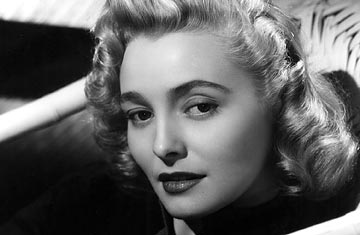
Patricia Neal in 1950
(2 of 2)
Mother first, actress second, Neal took supporting roles in The Miracle Worker on Broadway and Breakfast at Tiffany's on film. Viewers of this Audrey Hepburn valentine may forget that her beau, played by George Peppard, is a male prostitute — the original Manhattan midnight cowboy. Neal took the "other woman" role of his most demanding client. Suitably cool and cruel, she has one terrific scene where she spells out the economics of their relationship with a crispness Paul Krugman would admire.
How could Neal, with her family obligations in the remote English village Dahl had chosen, accept the role of Alma in the 1963 Hud? Martin Ritt, the film's director, promised to schedule her scenes in two clumps. Neal said yes, and won an Oscar for Best Actress. The role of housekeeper for the cattle-raising Bannons — Homer the patriarch (Melvyn Douglas), Hud the wastrel (Paul Newman) and his kid brother Lon (Brandon De Wilde) — was a supporting part, really, but she invested it with a dusty authenticity rarely seen in movies of the day. Dust-caked and straggle-haired, in a sleeveless housedress and wearing no visible makeup, she looks sexier, more gorgeous and desirable than ever, because her Alma is the total woman, too honest to kid herself or any guy. However roughly life and men have treated her, she wears her emotional battle scars like Medals of Honor. Neal gets all this through to the viewer with a slouching posture, a tired smile and, mainly, through the actor's alchemy of transforming performance into a living being.
Alma's seen-it-all sexuality might make her the female equivalent to Paul Newman's Lone Star stud, if only Texas women in the early '60s had the same freedom as men. As attracted to Hud as every other woman in town, Alma knows from hard experience not to cuddle up to a viper. In a wonderful scene in her bedroom, Hud flirts with Alma after she's won a few dollars playing cards with the other ranch hands. She allows that "I'm a good poker player," and he says, "You're a good housekeeper. You're a good cook. You're a good laundress." And, with a salacious smile: "What else you good at?" All this time, Hud is lying on her bed, fondling a long-stemmed rose; he's the coquette and she's the one too wary and weary to get involved. When he finally exasperates her to quit her job, she gets on the next bus out of town. "I'll remember you, honey," he says. "You're the one that got away."
Another reason Neal's performance here is exceptional: she wasn't the self-sufficient Alma. "I trusted my instincts completely when I was acting," she wrote in her autobiography As I Am. "I rarely did in real life." She was drawn to strong men who told her what to do. Dahl, her husband — no less than Roark with Dominique, or Cooper with Neal — ran her life. And once or twice, he saved it. She told Osborne that, when she had the first of her strokes, Dahl knew which doctor to call, which hospital to get her to; he pushed the physicians to keep her going; when they said she'd likely die, he virtually willed her to survive; then he steered her through the years of therapy that kept her alive and restored her speech and mobility. And then — knowing that, as she has often said, "I'm an actress from beginning to end" — he made her go back to work.
"He's the one that shoved me into it," she said of her husband's insistence that she take the role of Nettie Cleary in the film version of Frank Gilroy's Tony- and Pulitzer Prize-winning play, The Subject Was Roses. The play's director, Ulu Grosbard, had wanted Neal for Nettie, but she was in Hollywood. Now, three years after her strokes, she was available. Like Mary Tyrone in Eugene O'Neill's Long Day's Journey into Night, Nettie is a woman whose life is defined by the bitter belief that she settled for second best in her choice of a man. Now, after 20-some years with her husband John (Jack Albertson), her rancor keeps exploding, the pus splattering their son Timmy (Martin Sheen), just back from the war.
Neal's blistering performance is allowed just one ray of grace: a memory of a boy who, too shy to romance her, instead inadvertently gave her "the most beautiful black eye you ever saw!" As she soars briefly into that sweet, long-ago moment, her sour face turns beatific with a blushing smile — then collapses as she returns to the Hell of her reality. It's powerful, subtle work from a woman who recently had been given up for dead.
"At the end of that film," she told Osborne, "I was the happiest woman alive!" Neal was 42 when she made The Subject Was Roses, and lived another 42 years, but that was her last gasp as a great actress. Glenda Jackson, another fiercely intelligent actress, played Neal in the 1981 TV movie The Patricia Neal Story, with Dirk Bogarde as Dahl.
In As I Am, Neal wrote, "Time passes so quickly, and we endure many crises — life, death and great, great pain." For once this was not a star's self-pitying grandiosity. Neal had her own unique strength; she forced herself to live, to return to motherhood, to relearn the rudiments of her craft and dig inside to find the art buried in there. Few actresses can say their career was an inspiration, fewer still that their life was a tragedy with a triumphant ending. In her drawling, seductive voice, Patricia Neal could say both.
